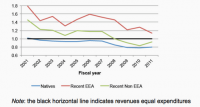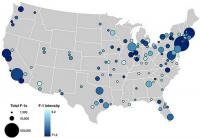-
Lawmaker wants to crack down on illegal hiring by state contractors
The federal E-Verify system, operated by the U.S. Citizenship and Immigration Services, screens for undocumented workers by comparing the information that job applicants submit to an employer with records maintained by the Department of Homeland Security and the Social Security Administration. A measure filed Monday in the Texas Senate would beef up punishment for employers that hire undocumented workers and seek to do business with the state.
-
-
Trump’s immigration policy would push legal U.S. workers down the occupational ladder
U.S. President-elect Donald Trump has proposed deporting millions of undocumented immigrants, and many voters appear to believe that deporting illegal immigrants would boost job opportunities and wages for U.S. workers. But our economic modelling suggests different conclusions. The eight million illegal workers currently in the U.S. workforce contribute to U.S. output. If all the illegal workers left the United States, our modelling found, then the U.S. economy would be 3 percent to 6 percent smaller. A smaller U.S. economy would need fewer workers in all occupations. The exception is farm laborers and construction workers: there would be fewer jobs overall in these occupations, but there would be more jobs for legal U.S. residents. This is because deporting illegal workers would open up vacancies. Moreover, in general terms, eliminating illegal workers from the U.S. workforce would change the structure of employment for legal workers away from skilled occupations towards low-skilled, low-wage occupations.
-
-
Immigration: Small impact on wages, employment of native-born U.S. workers
A new report on the impact of immigration over the past twenty years on the U.S. labor market and wages of native-born workers, found that the impact of immigration on the wages of native-born workers overall is very small. To the extent that negative impacts occur, they are most likely to be found for prior immigrants or native-born workers who have not completed high school — who are often the closest substitutes for immigrant workers with low skills. There is little evidence that immigration significantly affects the overall employment levels of native-born workers. Some evidence on inflow of skilled immigrants suggests that there may be positive wage effects for some subgroups of native-born workers, and other benefits to the economy more broadly. Immigration has an overall positive impact on long-run economic growth in the United States.
-
-
Texas threatens to withdraw from refugee resettlement program

As part of its ongoing fight to keep Syrian refugees out of the state, Texas is threatening to withdraw from the nation’s refugee resettlement program if federal officials refuse to “unconditionally approve” a state plan requiring additional vetting of relocated people.
-
-
More than 800 ineligible individuals granted U.S. citizenship owing to incomplete fingerprint records
U.S. Citizenship and Immigration Services (USCIS) granted U.S. citizenship to at least 858 individuals from special interest countries — individuals who had been ordered deported or removed under another name. DHS IG says that this happened because neither the digital fingerprint repository at DHS nor the repository at the Federal Bureau of Investigation (FBI) contains all old fingerprint records of individuals previously deported. Currently, about 148,000 fingerprint records of aliens from special interest countries who had final deportation orders or who are criminals or fugitives have yet to be digitized.
-
-
Europeans’ attitudes to migration do not depend on net migration levels

A new study has analyzed attitudes to immigration across twenty-one European countries and finds that negative attitudes do not appear to be linked with net migration rates. Some countries with high immigration levels are also very positive about migrants, such as Norway, while other countries like the Czech Republic and Hungary, which have low immigration. have populations with negative attitudes. U.K. respondents’ support for immigration is slightly lower than the European average, but they also have a slightly more positive view of migrants’ contribution to their country compared with a decade earlier.
-
-
Refugees can offer economic boost to host countries

Refugees are often considered an economic burden for the countries that take them in, but a new study indicates that refugees receiving aid — especially in the form of cash — can give their host country’s economy a substantial boost. The researchers found that these economic benefits significantly exceeded the amount of the donated aid. The findings come as refugee numbers around the world are growing.
-
-
Net migration to U.K. increases to 333,000
The British government has release new migration figures which show that net migration into Britain rose to 333,000 last year - 20,000 more than in 2014. About 308,000 of these immigrated to Britain for work, an increase of 30,000 from 2014. Just under 60 percent had a specific job waiting for them, but 42 percent arrived looking for work, which, the government notes, is a statistically significant increase from 104,000 the previous year. The information released by the Office for National Statistics is politically significant now, as Britain is a month away from a referendum on whether to remain in or leave the EU.
-
-
2015: 28 million people forcibly displaced by conflict, 19 million displaced by disaster

Conflict and violence internally displaced 27.8 million people in 2015. The number of people internally displaced by disasters in 2015 was 19.2 million in 113 countries. Additionally, at least a million people were forcibly displaced by criminal violence in Mexico and Central America, and tens of millions more by development projects such as dams and urban renewal projects.
-
-
Texas’s E-Verify law operating under honor system
After former Gov. Rick Perry issued an executive order in December 2014 mandating the use of E-Verify for state agencies, some lawmakers noted the directive lacked a mechanism to ensure compliance. But more than nine months after Gov. Greg Abbott signed a separate E-Verify bill, some of those gaps still exist.
-
-
EU migrants’ benefits and the U.K. EU-exit referendum
Ahead of Britain’s EU referendum, research will explore the experiences of EU migrants working in the United Kingdom, and attitudes to employment and social security – for which there is little empirical evidence, despite intense political rhetoric. An initial study suggests workers from the EU are significantly under-represented in employment tribunals.
-
-
New rule permits STEM graduates to stay in U.S. for 36 months

A new rule published by DHS this week allows foreign students in science and technology to extend their stay in the United States under the Optional Practical Training (OPT) program. The new rule will go into effect in May, and it will allow STEM graduates to stay and work in the United States for up to thirty-six months.
-
-
Candidates' plans to change controversial H-1B guest worker program highlight need for an overhaul
Since its inception in 1990, the H-1B guest worker program that allows employers to bring in high-skilled foreign workers on six-year visas has been steeped in controversy. Critics accuse it of depressing wages and outsourcing American jobs, while advocates call it an essential source of the best and brightest talent. The H-1B program is an important program that serves as a bridge to permanent immigration for talented foreign workers. It should be used to recruit truly specialized workers from abroad when the labor conditions are tight and a qualified American can’t be found. But no American worker should ever be displaced by an H-1B worker – that was never the program’s intent – and this practice should be ended.
-
-
Europe’s failed response to refugee crisis risks fraying local labor markets

As this crisis continues to unfold and countries in Europe reevaluate how to manage its challenges, it is essential that we take time to appreciate the broader context of the problem and some of the issues that have been neglected, specifically the negative effects on labor markets. While the plight of the refugees is desperate, the consequences of the crisis are also dire for some of the most significant achievements of European integration: open borders, social welfare, and human rights. They have also affected the functioning of European labor markets in ways that have been poorly understood. Understanding these effects is important because welfare, peace, human rights, and open borders all depend on the capacity of governments to generate wealth through work and production.
-
-
Immigrants play growing role in U.S. science and engineering (S&E) workforce
Immigration is a significant factor in decade-long growth in total science and engineering (S&E) workforce. From 2003 to 2013, the number of scientists and engineers residing in the United States rose from 21.6 million to 29 million. This 10-year increase included significant growth in the number of immigrant scientists and engineers, from 3.4 million to 5.2 million. Immigrants went from making up 16 percent of the science and engineering workforce to 18 percent.
-
- All
- Regional
- Water
- Biometrics
- Borders/Immig
- Business
- Cybersecurity
- Detection
- Disasters
- Government
- Infrastructure
- International
- Public health
- Public Safety
- Communication interoperabillity
- Emergency services
- Emergency medical services
- Fire
- First response
- IEDs
- Law Enforcement
- Law Enforcement Technology
- Military technology
- Nonlethal weapons
- Nuclear weapons
- Personal protection equipment
- Police
- Notification /alert systems
- Situational awareness
- Weapons systems
- Sci-Tech
- Sector Reports
- Surveillance
- Transportation
Advertising & Marketing: advertise@newswirepubs.com
Editorial: editor@newswirepubs.com
General: info@newswirepubs.com
2010-2011 © News Wire Publications, LLC News Wire Publications, LLC
220 Old Country Road | Suite 200 | Mineola | New York | 11501
Permissions and Policies
Editorial: editor@newswirepubs.com
General: info@newswirepubs.com
2010-2011 © News Wire Publications, LLC News Wire Publications, LLC
220 Old Country Road | Suite 200 | Mineola | New York | 11501
Permissions and Policies
